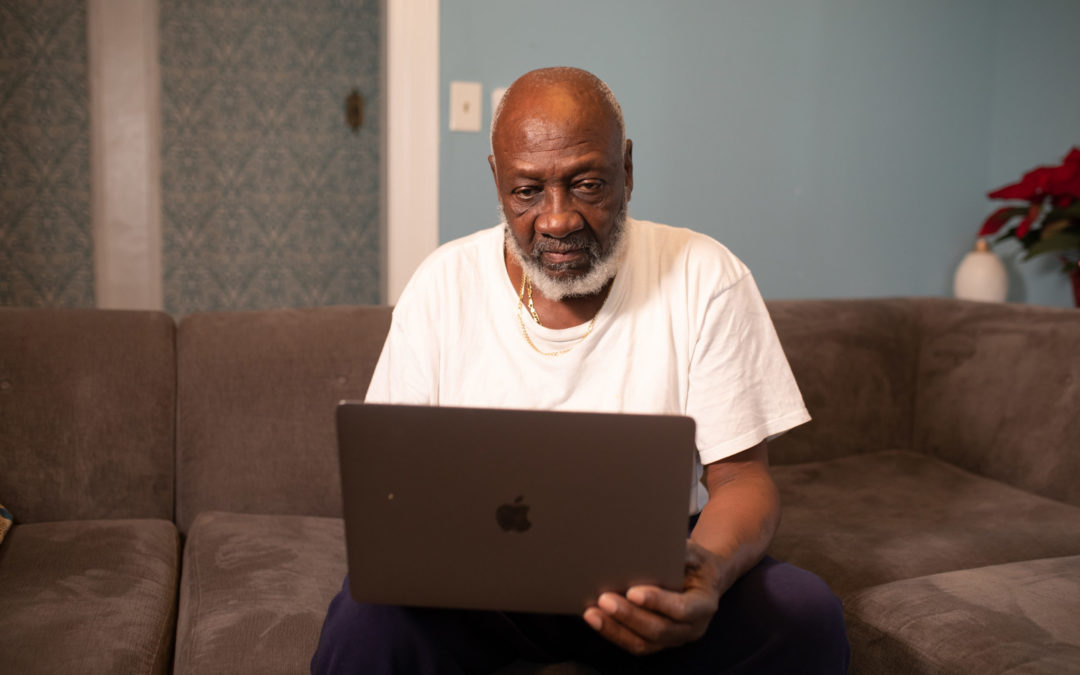From the Philadelphia Gay News
By Chelsea Greenberg
Digital literacy is of the utmost importance today, especially as the past two years have seen much of our daily lives move online. From social events to telehealth appointments, having access to technology has become more crucial than ever for our physical, social, and emotional well-being.
Unfortunately, there are still many barriers to accessing and effectively using technology. While the digital divide affects people of all ages and identities, LGBTQ+ older adults often face challenges in navigating the digital world. The high costs of smartphones, laptops, and monthly internet plans can be prohibitive for many. According to research from the Williams Institute, LGBTQ+ older adults are more likely than their cisgender and straight counterparts to experience financial hardship, thus making it more difficult to afford expensive technology.
Not only is there a barrier to affording smartphones and computers, but there is also the challenge of learning how to use that technology. Data from the Pew Research Center released before the pandemic showed that 34% of adults age 65+ reported low confidence in their ability to use electronic devices to do necessary online activities, pointing to the need for greater support for older adults learning to use new technology.
Even before COVID-19, LGBTQ+ older adults experienced higher levels of social isolation compared to straight and cisgender individuals. The combination of this social isolation, a lack of access to technological resources, and a pandemic that has disproportionately affected older adults, has made it difficult for many in our LGBTQ+ communities to maintain social connections throughout this pandemic.
However, there are a growing number of resources aimed at closing the digital divide and getting older adults online. Last month, at an Elder Initiative at William Way “Thrivers” program, our group members compiled a brainstorm of the various programs and resources that they knew of or had utilized to access phones, computers, internet plans, and digital literacy training in the Philadelphia region.
Low-Cost Internet
Comcast Internet Essentials (www.internetessentials.com, 1-855-846-8376) provides low-cost high-speed internet for $9.95/month to those who qualify based on income. The Affordable Connectivity Program (www.acpbenefit.org, (877-384-2575) helps low-income households pay for internet service and connected devices, providing discounts of up to $30 a month on internet service. Lifeline (www.fcc.gov/lifeline-consumers, 800-234-9473) is a federal program that provides monthly discounts on internet and phone service for eligible low-income subscribers.
Laptops, Tablets, and PCs
In addition to getting low-cost internet service, individuals who enroll in Comcast Internet Essentials can purchase low-cost computers and laptops. Similarly, participants in the Affordable Connectivity Program can receive a discount of up to $100 for a laptop, tablet, or desktop computer. The organization PCs for People (www.pcsforpeople.org, 651-354-2552) sells low-cost refurbished laptops and desktops to income-eligible individuals. Locally, Temple TechOWL (www.techowlpa.org, 800-204-7428) offers free rentals of iPads, laptops, headphones, and other assistive technology. Individuals can borrow up to five devices at a time for up to nine weeks! The Drexel ExCITe Center (www.drexel.edu/excite, 267-217-3508) can also provide technical assistance and connections to internet providers and low-cost computers.
Cellphones and Data Plans
Organizations like Assurance Wireless (www.assurancewireless.com, 1-888 321-5880), TruConnect (www.truconnect.com, 1-800-430-0443), and QLink (www.qlinkwireless.com, 1-855-754-6543) all provide low-cost or free cellphone and data plans. Assurance Wireless and TruConnect both operate as part of the federal Lifeline program and provide free smartphones and monthly data to those meeting income qualifications. QLink Wireless provides a free monthly cellphone plan with unlimited data for those who already own a phone. They also have an option to purchase a $10 tablet!
Digital Training Programs
Even with access to technology, it is important for older adults to have support in developing the skills to navigate the internet and their devices. Cyber Seniors (www.cyberseniors.org, 1-844-217-3057) offers free tech training and online courses for older adults, including live 1:1 support! Philadelphia’s Digital Navigator Program provides remote or in-person support to Philadelphia households around accessing and using technology. This program operates through a few local agencies including Beyond Literacy (215-426-7940), Drexel ExCITe Center (267-217-3508), and SEAMAAC (215-867-9732). The Critical Path Learning Center at Philadelphia FIGHT (www.critpath.org, 215-985-4448.) also offers a series of digital literacy courses and workshops for adult learners.
Additionally, the Elder Initiative at William Way will soon be launching a free digital literacy program through a partnership Generations Online (www.generationsonline.com). Community members will be able to borrow tablets loaded with self-guided digital literacy tutorials. For more information, you can call the Elder Initiative at 215-720-9415.
Connecting our LGBTQ+ communities with the technology and knowledge to navigate the digital world is crucial in helping to keep us all engaged and supported during this pandemic and beyond!
Chelsea Greenberg (they/them) is a graduate student in social work at the University of Pennsylvania School of Social Policy & Practice and an intern with the Elder Initiative at William Way.

